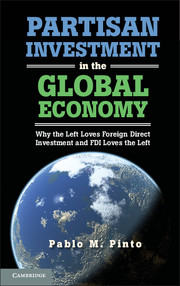 Partisan Investment in the Global Economy
Partisan Investment in the Global Economy Book contents
- Frontmatter
- Contents
- List of Figures
- List of Tables
- Acknowledgments
- 1 Domestic Coalitions and the Political Economy of Foreign Direct Investment
- 2 A Political Economy Model of Foreign Direct Investment
- 3 Tying Hands or Exchanging Hostages: Partisan Governments, Commitment, and FDI Performance
- 4 Partisan Governments and Foreign Direct Investment: Results from Cross-Country Statistical Analyses
- 5 Labor and Business Influence, Investment Regimes, and Foreign Investment in Argentina
- 6 Business Influence, Politics, and Foreign Direct Investment in South Korea
- 7 Conclusion
- Bibliography
- Index
5 - Labor and Business Influence, Investment Regimes, and Foreign Investment in Argentina
Published online by Cambridge University Press: 05 March 2013
- Frontmatter
- Contents
- List of Figures
- List of Tables
- Acknowledgments
- 1 Domestic Coalitions and the Political Economy of Foreign Direct Investment
- 2 A Political Economy Model of Foreign Direct Investment
- 3 Tying Hands or Exchanging Hostages: Partisan Governments, Commitment, and FDI Performance
- 4 Partisan Governments and Foreign Direct Investment: Results from Cross-Country Statistical Analyses
- 5 Labor and Business Influence, Investment Regimes, and Foreign Investment in Argentina
- 6 Business Influence, Politics, and Foreign Direct Investment in South Korea
- 7 Conclusion
- Bibliography
- Index
Summary
Introduction
In previous chapters, I argue that foreign direct investment has differential effects on the demand for workers and business services in recipient countries, and that these distributive motivations are at the core of the politics of regulating FDI. The evidence from cross-national statistical analyses suggest that pro-labor governments, usually those on the left side of the political spectrum, are more likely to regulate inward FDI more favorably, and to consequently receive larger FDI inflows, than are their right-leaning counterparts, who are usually associated with the advancement of the interests of domestic businesses. The policy effect is strongest when a pro-labor government is able to enact the policy preferred by its core constituency, which occurs when the pro-labor government is unconstrained institutionally or politically. In this chapter, I analyze the relationship between constituency links, which can be attributed to partisan alignments, and foreign investment in Argentina in the postwar era.
Argentina's post-war history offers an exceptional background to explore this relationship in more depth. The dramatic movements in the country's governance from democratic to autocratic rule and back has resulted in the alternation of coalitions representing disparate socioeconomic actors in power. The institutional structure provides the permissive environment for the emergence of diverse coalitions of workers, industrialists, agricultural producers, financiers, and consumers. The ascension to power of opposing coalitions, which resulted from electoral turnover or coups is reflected in the diverging foreign economic policies adopted over time.
- Type
- Chapter
- Information
- Partisan Investment in the Global EconomyWhy the Left Loves Foreign Direct Investment and FDI Loves the Left, pp. 142 - 204Publisher: Cambridge University PressPrint publication year: 2013
- 1
- Cited by


